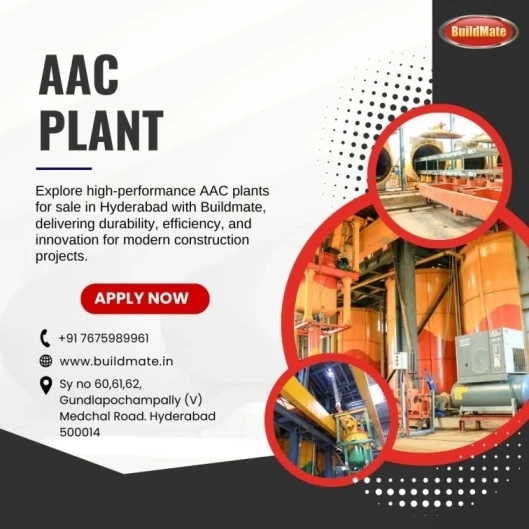The construction landscape in India is undergoing a green revolution—and Autoclaved Aerated Concrete (AAC) blocks are at the center of it. These lightweight, thermally insulating, and eco-friendly blocks are rapidly replacing traditional clay bricks. To meet rising demand, businesses are investing in AAC plants equipped with high-performance machinery.
In this guide, we’ll walk you through the essential AAC plant machinery, cost-influencing factors, and why Buildmate stands out as a trusted AAC plant supplier.
✅ What Is an AAC Plant?
An AAC plant is a manufacturing facility that produces AAC blocks using a blend of fly ash (or sand), lime, cement, gypsum, and aluminum powder. Through a carefully controlled chemical reaction and high-pressure steam curing, these ingredients form durable, lightweight blocks ideal for modern construction.
Whether you're planning a full-scale factory or a compact unit, the right equipment is key to consistent quality and efficiency.
🏗️ Essential AAC Plant Machinery
Setting up an efficient AAC block plant requires machinery for each stage of the process:
- Raw Material Handling & Storage
- Includes silos, bucket elevators, and screw conveyors for smooth and clean material movement.
- Dosing & Mixing Systems
- Ensures accurate blending of raw materials, essential for uniform block strength and consistency.
- Slurry Casting System
- Pours the mix into molds for expansion, forming the cellular structure of AAC blocks.
- Rising & Pre-Curing Chambers
- Allows the aerated slurry to set and rise, forming a semi-solid mass ready for cutting.
- Cutting Machines (Vertical & Horizontal)
- Precisely cut the blocks into desired sizes with minimal waste.
- Autoclaves
- Critical for steam curing at high temperature and pressure, enhancing the block’s strength and insulation.
- Boilers & Steam Generation
- Provide consistent steam supply for autoclaving, ensuring optimal curing conditions.
- Tilting & De-Moulding Equipment
- Safely separates the set mass from molds to prevent block damage.
- Packing & Handling Systems
- Automate stacking and packaging to streamline logistics and protect the final product.
📉 Factors Influencing AAC Block Plant Cost
Several factors affect the overall AAC block plant setup cost:
- Plant capacity: Smaller units are more affordable but may limit output.
- Automation level: More automation reduces labor but increases setup cost.
- Machinery quality: Durable, efficient machines mean fewer breakdowns and lower long-term costs.
- Location: Strategic locations like Hyderabad offer cost benefits and market proximity.
Estimated Costs:
- Small-scale AAC plant: ₹1.5 to ₹3.5 crore
- Large, automated plant: Higher investment with greater returns
🇮🇳 Why AAC Blocks Are in High Demand in India
AAC blocks are gaining momentum due to:
- Superior insulation (thermal and acoustic)
- Lightweight structure reducing construction load
- Fire and pest resistance
- Sustainable manufacturing using fly ash
With urbanization and green building trends rising, AAC blocks are becoming the go-to material for residential, commercial, and industrial projects.

🏁 Buildmate: Your Trusted AAC Plant Partner
Setting up a high-performance AAC plant starts with the right partner. Buildmate is a leading name in AAC plant solutions, offering:
- Turnkey machinery and custom plant designs
- Comprehensive installation and training
- Post-sales support and expert consultation
Whether you're launching a new unit or upgrading an existing one, Buildmate’s machinery ensures precision, durability, and efficiency.
👉 Explore AAC plant models, machinery, and pricing at: Buildmate


